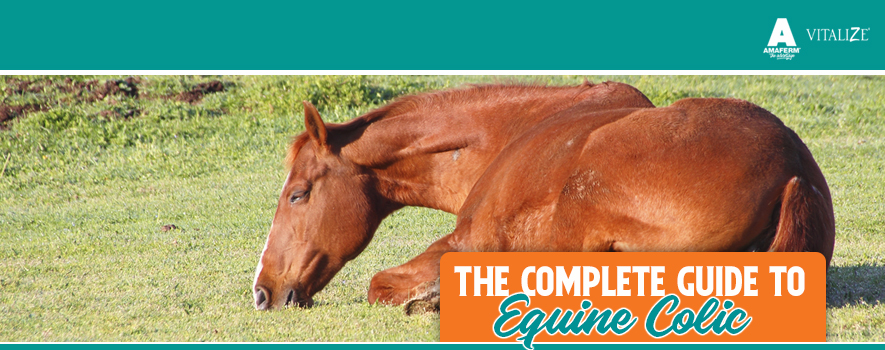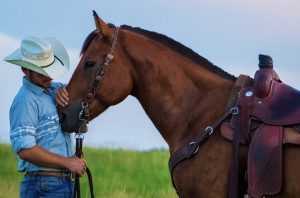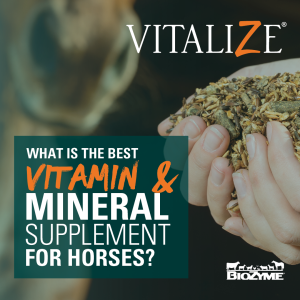
Colic could certainly be labeled as the most common health concern in the modern horse. In a 2017 report by Pet Plan Equine, colic was reported to be the third most common insurance claim for adult horses, superseded only by arthritis and ulcers. Combine ulcers and colic into “gut health” claims, and you will without a doubt conquer the greatest insurance claim race. To further the pain, the average cost of a colic incidence is about $2,000 and the maximum cost, with lengthy surgery and recovery, is up to $10,000.
But what is colic? Even though we tend to treat colic as an illness in itself, it is actually a clinical symptom. Yes, the definition of colic is “pain of the abdomen.” There is quite obviously a plethora of things that can cause abdominal pain so there are many types of colic. These commonly include impaction colic, displacement or entrapment, gas colic, sand colic, strangulation colic, enteritis, and last of all, idiopathic (unknown cause) colic. We can define these as follows:
- Impaction colic: Impaction occurs when forage, sand, dirt, or other material gets lodged in the colon, causing the horse to be unable to pass manure and putting a halt to the whole digestive system. Impaction can also be caused by enteroliths, naturally occurring mineral deposits that can reach up to 15 pounds in size.
- Displacement or entrapment: This occurs when the large colon moves to an abnormal location. Often this happens at the pelvic flexure, an area where the colon narrows and makes a sharp turn. In some cases, displacement can also lead to entrapment, where something traps the gut and can cut off blood supply.
- Gas colic: Mild abdominal pain can simply be the result of gas buildup in the horse. This can be caused by a change in diet, low roughage consumption, parasites or administration of wormer.
- Sand colic: Sand colic is caused by the abnormal consumption of large amounts of sand while grazing or eating off dry, sandy ground. Upward of 80 pounds of sand have been found in a colicking horse’s gut.
- Strangulation colic: A twist occurring in the gut causes strangulation colic, which often cuts off blood supply and results in dying tissue. This type of colic is one of the most serious and can be fatal.
- Enteritis: Abdominal pain can be caused by enteritis, the general inflammation of the gut. This inflammation is most commonly caused by colonization of the gut by pathogens (bacteria or viruses).
- Idiopathic colic: The majority of colic cases are idiopathic. This means the cause is unknown or unable to be determined.
Most types of colic have a few general symptoms in common. These include restlessness, pawing, frequently rolling and lying down, looking back at the flank, lack of appetite, inability to pass manure, sweating, increased respiration rate, kicking at the stomach with hind legs and overall discomfort. If you notice a horse exhibiting these symptoms, without resolve, a veterinarian should be called. The veterinarian may ask you to walk the horse, withhold feed or possibly administer an NSAID, such as Banamine. However, do not medicate the horse without first speaking to a veterinarian. The many faces of colic make it difficult to understand what exactly you are dealing with. The vet may be able to ask questions to determine more about the instance of colic and determine the best course of action and if a visit is required.
Of course, prevention is the best way to deal with colic. However, the total prevention of colic is challenging at best. Think about yourself; it is difficult to prevent a stomach ache entirely. However, there are some things you can do to limit the chance of colic developing. No different than preventing a stomach ache by not drinking spoiled milk or eating a whole package of cookies!
First, make sure the horse has easy access to fresh, clean water. If horses are housed individually, make mental notes on how much water the horse usually drinks in a given amount of time. This will help you determine if there is a change in water consumption, which could indicate a potential problem.
Provide good quality forage as the major component of the diet and limit the intake of grains to the smallest amount required. Also, if you plan to change the horse’s diet, make changes gradually. This will allow the microbes in the gut to adapt to the changes and help ensure proper digestion.
Try to limit the amount of stress put on the horse. Allow as much time in the pasture or paddock as feasible, and allow them to move freely, socialize and graze. Stress is likely one of the most common causes of colic. Stress causes release of the hormone cortisol from the adrenal glands, which can cause colic, ulcers and diarrhea.
Lastly, providing digestive support to the horse can reduce the risk of colic. Digestive supplements can enhance gut health to improve digestion and limit interruptions of the microbes in the gut. One example is Vitalize® Digest More® Plus, a daily supplement with Amaferm®, a precision prebiotic that enhances the good gut microbes, and MOS, a beta-glucan, to eliminate pathogens. In addition to a daily supplement containing prebiotics and/or probiotics, a concentrated single-use product, like Vitalize Equine Gel, can also provide support to the gut in desperate times. Vitalize Equine Recovery Gel is designed to be used as a preventative against digestive upset from any changes in the horse’s routine, diet or environment that cause stress. Administer Recovery Gel anytime your horse is under stress, or at the first signs of digestive upset, for a happier, healthier horse.

